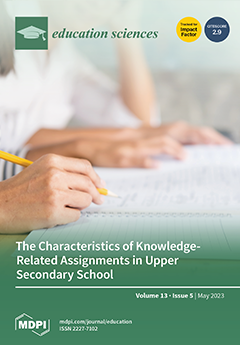(1) Background: This study aimed to examine the effect of assimilating coaching tools among educational staff on the cultivation of (emotional, behavioral, and cognitive) self-regulation skills among Palestinian Arab middle school students in Israel. Little attention has been paid to the relationship between
[...] Read more.
(1) Background: This study aimed to examine the effect of assimilating coaching tools among educational staff on the cultivation of (emotional, behavioral, and cognitive) self-regulation skills among Palestinian Arab middle school students in Israel. Little attention has been paid to the relationship between coaching-based teaching and students’ self-regulation among middle school students, let alone students from segregated and disadvantaged communities worldwide. (2) Methods: A quasi-experimental study was designed to test the hypothesis that there are differences in self-regulation between students who participate in coaching-based teaching and those who do not. Six hundred Palestinian Arab middle school students participated in this study and were randomly assigned to two groups: an experimental group (
n = 300) and a control group (
n = 300). All participants completed a pre- and post-test instrument that included the Adolescent Self-Regulatory Inventory (ASRI), and repeated-measures ANOVAs were used to analyze the data. Repeated-measures analysis of variance was employed to examine the effect of coaching on the students’ level of self-regulation. To examine the sources of the differences, Tukey’s post hoc tests were used. (3) Results: A statistically significant correlation between coaching-based education and students’ ability to take responsibility and ownership for their own learning was revealed. The results showed that the mean of the self-regulation variable before the intervention in the experimental group was significantly lower than that after the intervention (t = −13.70,
p < 0.001) and that the mean of the experimental group after the intervention was significantly higher than that of the control group after the intervention (t = 29.62,
p < 0.001). Furthermore, there were significant effects on self-regulation at the time of measurement (before and after the intervention) (F (1, 299) = 49.87,
p < 0.001) and for the participant group (F (1, 299) = 497.13,
p < 0.001). In addition, no significant difference was found in the self-regulation mean score for the control group before and after the intervention (t = 0.55,
p > 0.05). These results demonstrate that coaching had a positive effect on the participants’ level of self-regulation. Recommendations: We recommend that coaching-based pedagogy be incorporated into the education system, in general, and in education systems that serve the needs of marginalized and disadvantaged communities, in particular.
Full article





